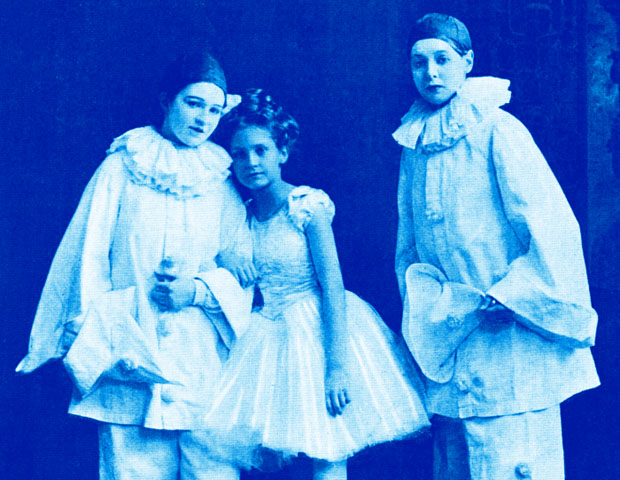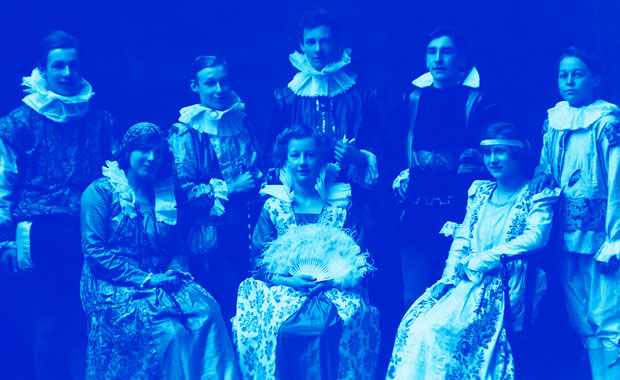|
|
 |
| My Favourite Planet > Blogs > Edwin Drood's Column > March 2015 |
 |
 |
back |
Edwin Drood's Column |
 |
17 March 2015 |
 |
|
 |
 |
| |
Symphonic forms

A memoir of my schooldays commences

Part 1 |
Part 1
Part 2
Part 3
Part 4
Part 5 |
| |
In which Edwin recalls the day that he became cool, muses on the muses
and considers the effects of boarding school on issues of identity.
|
|
“You can tell they’re all the same underneath the pretty lies
Anyone for tennis, wouldn’t that be nice?”

Anyone for Tennis, Cream
|
Unlike the genuine article, I was not born cool, but rather had it thrust upon me. Of course, like so many things in youth and young adulthood, it was just a phase. It had a clear beginning and a rather fuzzy end a couple of decades later. I am under no illusions about my position on the cool scale these days. But for a while – back there, back then – I had it nailed. It all started, more or less by accident, just after my fourteenth birthday, one Wednesday morning. |
| Overture |
At boarding school we had to wear those old-fashioned shirts with detachable collars and double cuffs. The collars – crisp but reasonably malleable for the weekdays, starchy, hard and high for Sundays – were held on by little porcelain and nickel collar studs. The double cuffs were folded back and held in place by cuff links. These links were our sole luxury, the only way we could express an individual preference in the context of an otherwise rigorous uniform code of dark green Harris Tweed jacket, white shirt, school tie and anthracite trousers. They could be brushed aluminium, stainless steel, silver, gold, bone, mother of pearl … anything we liked. We vied with one another, discreetly, as English boys do, for the honour of the coolest cufflinks.
 For my fourteenth birthday, my uncle Haviland sent me a pair he had specially ordered to be made from the base of large-bore rifle cartridges, while the revolving piece to secure the cuff was the bullet itself. They were heavy, though not too cumbersome. The moving parts made a satisfying click as they locked into position. They were dark, sinister, with a greenish shine to the grooved finish of the old brass and, above all, they held the cardinal virtue of being quite unlike any others in the school, and possibly in the country, at the time. |
| Exposition |
There was, however, a problem. Having just been fitted that term for a new tweed jacket and Sunday suit (both quite essential, as I was outgrowing stuff faster than my dear parents could supply it), my new links were going to spend their life in concealment, much like their mysterious donor. To make matters worse, the shirt our assistant matron had issued me with that morning (we went to the laundry room every other day, for a clean one plus two collars), was not the newest, the sleeves were now a tad too short. So, very much wanting to show off my new cufflinks, I simply left the cuffs unfolded, thereby gaining two and a half inches of length, and wore them hanging down over the heel of my hand.
 That very first morning, the effect was electric. I was looked at, noted, catalogued in an entirely agreeable way. No one said anything. There was no conversation or visible reaction beyond a quick, appreciative glance, but I realised that I had become cool. Suddenly and quite unexpectedly, my status had changed from slightly nerdy intellectual to fashion icon. For me, of course, it had to be all about the cufflinks.
 I was wrong. Actually it was all about the cuffs. Within a day the first brave imitators appeared, and before a month had passed, the recognisably cool kids in the school were wearing their cuffs long, at which point I quite unintentionally raised my game. The wonderful cufflinks, despite their extreme cult value, were starting to annoy me by catching in things: the corner of the page I was writing on, door handles, branches of trees (yes, I was still at that age) or banging on my viola at orchestra rehearsals. After a few weeks of this, I decided to do without, regretfully returning them to the little leather box they still occupy and have only left on a few occasions since. Little did I realise that such a move was radical. It was the public school equivalent of going commando. I was now link-less, a free man! |
| Intermezzo |
It was time I learned one of the first lessons of cool. It isolates you. The cooler you get, the less air there is. Within days, the extended cuff trend was over for most of the school. They were simply not ready to give up their prized ornaments. Finally, there were perhaps a half-dozen boys in my house and another dozen spread across the other four houses, who were ready to move up into the rarefied regions of “linklessness”. Only later did I realise that this happy few were marked out by something else, too. We all spent a lot of time in the various libraries of that ancient warren of monastic buildings we temporarily called home. We were not just the dandies of the new sobriety; we were cultivated dandies. In another year we would become the founders of a club, “The Literati” which, as I learn from the glossy pages of the magazine my old school still sends me once a year, exists to this day. Amazing, what a pair of cufflinks can do!
 Unlike Groucho Marx, At the time I found nothing inherently suspect in being part of a club that would have someone like me as a member. This may be because I was not too sure who that “someone like me” actually was. For a while I thought I might be homosexual. For some reason this did not disturb me much, despite the animus of the era. After all, Oscar Wilde had been homosexual, and by the 1960s, nobody doubted how cool he was! But then, realising that the only boys I had crushes on were a lot younger than me and jaw-droppingly beautiful in that long-lashed, feminine way that some boys display before treacherous puberty and the pock-marked ravages of youth set in, I surmised that I might just be a more-or-less typical fifteen-year-old, but totally deprived of female company. |
 |
| Development |
The solution was to get more involved in school music and drama. The music side involved joining the choral society (I was already in the orchestra) and performing a couple of major works each year with genuine girls from the nearby, and highly elite, Plantagenet School. For me it also meant forming a string quartet, under the direct guidance and protection of the heads of music from both schools. This compact little ensemble brought me great joy, partly from the quality of the music we played, but mainly because of the company I kept. Graham Nimmus, up till then a rather distant and arrogant-seeming senior and demi-god of the violin, turned out to be a person of great feeling; articulate, friendly and with a wicked sense of fun. The quartet’s other two members were Plantagenet girls, Madeleine St. Cross on second violin and Dora Fenton-Moria on cello. They were both titled, lady something-or-other and baroness whatever, which was rather an intimidating thought for about the first ten minutes of the first rehearsal.
 Our initial, atonal scratching at a tricky bit of Schubert (only Graham was properly prepared) showed that we were all equally nervous, and before the end of the first movement we’d collapsed into four boneless heaps of hysterical idiocy. This set the tone for the humoristic and brutally honest approach to the classical canon that would carry us serenely through the next three years. We all agreed that I was the weakest link. “Edwin, you’re rubbish! No wonder you took up the viola. If you played a less sought-after instrument, nobody would want you.” But Maddy, Dora and Graham became closer to me than my family. We were that which passes for inseparable in the context of one’s schooldays … and I haven’t the slightest idea where they are now or what happened to any of them. |
| Recapitulation |
Contrary to received continental wisdom, not all English aristocratic girls resemble horses. I was delighted to discover that I really, really, really wanted Dora’s long, pale legs wrapped around me instead of her cello, and Maddy’s delicate little hands tortured me deliciously as they danced up and down the neck of her violin. Although my desires never led to anything much, as we were far too busy in the brief time we had together, this realization was definitely a relief, because the school drama society was causing me any amount of bother in the same department. When a boy you already find disturbing is put into a dress and makeup and you’re expected to enact his/her gradual seduction, it’s difficult to remain calm, especially in iambic pentameter.
 At even such a progressive school as ours had lately become in the second half of that century, it was not only the stars that stood in opposition. * Fortunately, here too, the Plantagenets eventually came to the rescue. After a year of tough negotiation with the dragons that guard the virtue of such maidens, the two schools’ intrepid Heads of English, who I believe had their own thing going on, finally drew up a mutual support agreement for a series of annual joint productions. It was decided that our new theatre, a brilliant modern conversion of a former refectory, and thus a far superior facility from the little stucco niche at the end of what had once been the ballroom at Plantagenet House, should serve as the workspace for these productions. The twelve most thespian of the Plantagenet girls, who also turned out to be the most libidinous, were to be bussed in once a week for rehearsals. Overnight, William Shakespeare and Anton Chekhov became mysteriously popular with my rugby-playing classmates. The swinging sixties had finally arrived in the depths of Wiltshire.
To be continued ...
© Edwin Drood

* See The definition of love by Andrew Marvell (1621-1678) |
|
Edwin Drood's Column, the blog by The Mysterious Edwin Drood,

at My Favourite Planet Blogs.
We welcome all considerate responses to this article
and all other blogs on My Favourite Planet.
Please get in contact. |
 |
Visit the My Favourite Planet Group on Facebook.

Join the group, write a message or comment,
post photos and videos, start a discussion... |
|
Views of blog authors do not necessarily reflect those of the publishers
or anyone else at, on or in the vicinity of My Favourite Planet. |
 |
 |
|
|
| |
| |
|
| |
 |
| |
 |
| |
 |
| |

George Alvanos

rooms
in Kavala's historic Panagia District

Anthemiou 35,
Kavala, Greece

kavalarooms.gr
 |
| |

Olive Garden Restaurant

Kastellorizo, Greece

+30 22460 49 109

kastellorizo.de
 |
| |

Papoutsis
Travel Agency

Kastellorizo, Greece

+30 22460 49 286

greeklodgings.gr
 |
| |
|